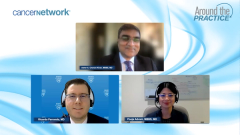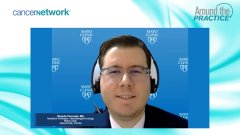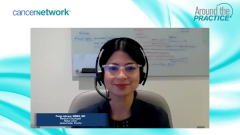
Role of Second-Generation BTKis in R/R CLL: Key Efficacy and Safety Data
The panel discusses key data from the ALPINE trial comparing ibrutinib and zanubrutinib in relapsed chronic lymphocytic leukemia, showing a progression-free survival favoring zanubrutinib; Ricardo Parrondo, MD, suggests this may be due to its better toxicity profile, leading to longer patient adherence.
Episodes in this series

Asher A. Chanan-Khan, MD, MBBS: It would be important to mention the ALPINE [NCT03734016] data and the final report presented by Dr Brown, which is now published in the New England Journal [of Medicine], where ibrutinib in the relapse setting was compared head-to-head with zanubrutinib. Over 650 patients were enrolled, with a 29-month follow-up. At the 24-month analysis, progression-free survival [PFS] was 78% in favor of zanubrutinib vs 65% [with] ibrutinib. And that was interesting to me. The group of patients [with] 17p [deletion] did better with zanubrutinib. The median progression-free [survival] was not reached in the zanubrutinib group in 34 months, and the median overall survival [OS] has not been reached for the group. But this report was a bit of a surprise to me because as you mentioned earlier, [in] the BTK [Bruton tyrosine kinase] pathway, which is the proliferative pathway, it didn’t matter which drugs stopped the BTK transmission that it was signaling. We know that any BTK you pick up has [more than] a 90% response rate. But this was the first time, to my surprise, where the first and second generations, when compared head to head, showed a PFS benefit in favor of the second generation. Your comment on that?
Ricardo Parrondo, MD: It’s interesting and unexpected. I also did not expect to see that difference. But it’s probably a testament to the fact that it’s a more selective BTK inhibitor [BTKi]. And given the better toxicity profile, patients are more likely to stay on it longer.
Asher A. Chanan-Khan, MD, MBBS: Yes. [By] the same token, the ASCEND trial [NCT02970318], which had final data presented again, was acalabrutinib vs investigator choice. It was basically idelalisib or a PI3K [phosphoinositide 3-kinase] inhibitor vs BR [bendamustine and rituximab], with more patients on idelalisib. So comparing BTK vs PI3K inhibitor was what I ended up gleaning from this, and in this particular trial, there were over 300 patients, with a median follow-up that was pretty decent, 45 months. PFS was not reached with acalabrutinib in 16 months. And if you look at 42 months when they reported the PFS rates, it was 62% vs 90%. This trial plus my own personal experience completely made me shy away from PI3K inhibitors, and the OS rate was decent with acalabrutinib. It was 78% at 42 months. So the only thing I noted was that atrial fibrillation was about 8% and only 3% in the control arm. Is there anything you’d like to comment on about that?
Ricardo Parrondo, MD: The results are not surprising. I think the most robust therapies for CLL [chronic lymphocytic leukemia]are BTK and BCL-2 inhibitors. The PI3K inhibitors are not as effective as those other BCL-2 and BTK inhibitors. And we already know that BCL-2 and BTKis are superior to chemotherapy/ immunotherapy. So the results are not surprising. But these data have made me shy away from PI3K inhibitors in the relapse setting, and I’m more likely to stick to the BCL-2 or the BTK pathway.
Asher A. Chanan-Khan, MD, MBBS: The median OS in the ALPINE [NCT03734016] data are also worth mentioning here. The OS was not reached in any treatment arm, but it was significantly longer in the AO [acalabrutinib and obinutuzumab] arm vs the control, which is obinutuzumab and chlorambucil [O plus C], with a significant hazard ratio. And the estimated 60-month OS for AO was 90% vs just acalabrutinib, [which] was 84%. And 82% given that in O plus C there was a significant transfer over to the BTKi arm single agent. It’s important to know that the first BTKi was better. We have discussed that, but there’s a slight advantage of the combination, but not that much. So one can think about that.
Newsletter
Stay up to date on recent advances in the multidisciplinary approach to cancer.








































